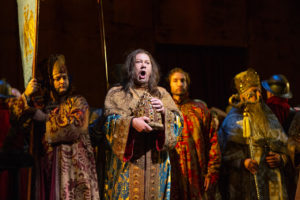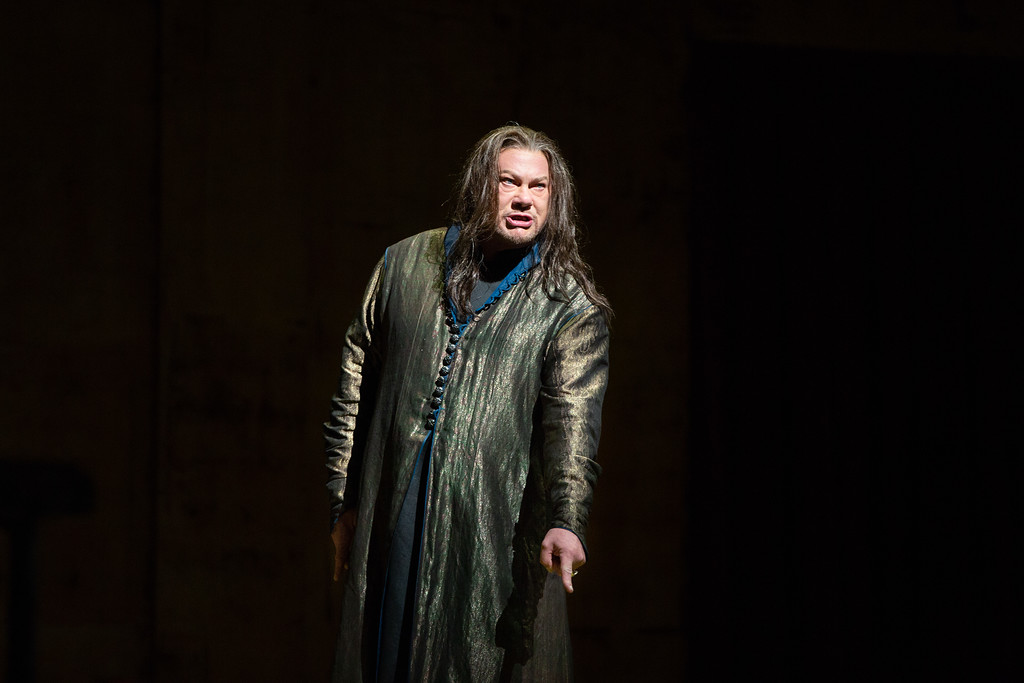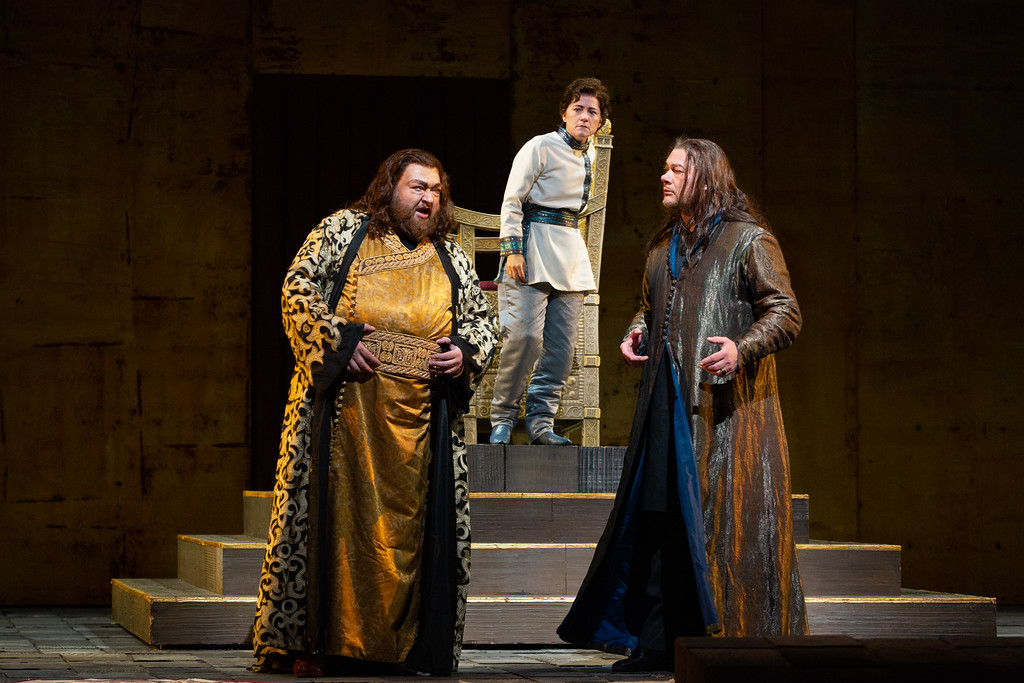
Metropolitan Opera 2021-22 Review: Boris Godunov
René Pape Delivers a Tour de Force Performance in Unbalanced Revival
By Francisco Salazar(Credit: Marty Sohl/ Met Opera)
On Sept. 28, Mussorgsky’s “Boris Godunov” returned to the Met for the first time in a decade in Stephen Wadsworth’s acclaimed production.
When the production first premiered back in 2010, the company had presented the 1872 version with the composer’s original orchestration and additions from the 1869 version. The production was conceived with Mussorsgky’s revisions and created a structure that worked visually. However, for this revival, the company opted for Mussorgsky’s original 1869 version with no intermission. The result was a mixed bag that seemed to end awkwardly and a production that was visually and tonally rather incongruous.
The Imbalance Caused by 1869
The 1872 version is structured with the chorus opening and ending the opera. It then gives three scenes to Boris from the beginning, middle, and end of his reign. Interspersed between those scenes, Mussorgsky dedicates two major moments to Grigory, the pretender thus allowing him and the other characters more development. Of course, it must be mentioned that Mussorgsky was forced into this revision after his initial version was rejected on the grounds that it “lacked a strong female part.”
So he remedied that by adding a love interest for the Pretender, thus forcing the character development and the change in structure. And while some have argued that the original version is stronger and more focused on the title character, I would contend that the latter edition is stronger not only in the grander scheme of the story the opera aims to tell but also as an opera.
Cutting out the final scene and the Polish Act with Grigory leaves the overall opera with a massive plot hole. Because beyond introducing him in his scene with Pimen, the character feels unessential to the opera and dramatically, the scene at the Inn not only feels like it belongs in another opera, but feels extraneous to this one altogether. And the structure of the 1869 version, while certainly giving Boris greater spotlight in its second half, does so at the detriment of overall pacing. Because his scenes are put one after the other, his downfall feels rushed. By having them interspersed in the latter version and juxtaposed with the intrigue of Marina and Rangoni in the Polish Act, the audience is better able to not only understand but truly feel the looming fears and paranoia that end up killing Boris. Without them, the audience is asked to understand Boris without context.
The production also seems to be unbalanced as a result with the opening scenes and the Grigory scenes are all set against a blue backdrop while all of Boris’ scenes are within the confines of a gold background. In the original version of the production, the blue backdrop also appeared during the final scene and the Polish Act, giving audiences a perspective of the private vs the public. Without these scenes, the blue backdrop in the production seems out of place and beginning with it doesn’t create the visual balance and the parallels that Wadsworth intended when the production first premiered.
Then there is a massive history book on stage right which is a symbol for history being written. Yet in this version, the book is alluded to very few times, diminishing its symbolism and overall impact.
But there were still some interesting visual elements that worked. The gold backdrop featured blood stains that symbolized the crimes of Boris. Meanwhile, the throne never faced the audience and instead was always in profile, emphasizing how power is always hiding from public view.
Pimen and Boris were also foils of one another, with the former dressed in a white cloak that represented peace and purity while Boris is seen in a black cloak, tormented by his crimes and tyrannical rule. At the end of the opera, Boris takes off the black cloak in an attempt to atone for his sins matching Pimen’s exact wardrobe.
The Two Stars
Like the production, the basses portraying Pimen and Boris could not have been more different in vocal quality and delivery. And both René Pape and Ain Anger delivered devastating performances.
As Boris, Pape reprised his commanding portrayal of the tormented Tsar. After 10 years, Pape’s interpretation seems to be getting better and his instrument continues to possess the same power and grit of that first series of Met performances. Pape is first seen at the beginning of the opera, in a brief scene where he is tormented by the Holy Fool. From that small moment, one can already tell that this character is unstable and that his downfall is inevitable.
During the coronation scene, Pape’s Boris entered the stage confused and almost a bit deranged, shying away from the crowd. He kneeled on the ground and began his internal monologue with hesitancy and fear. The voice was filled with melancholy as he prayed to God for protection. His singing eventually garnered a strong and imposing sound that emulated that of a ruler. However, as he was crowned and the chorus roared with joy, Pape’s movements expressed an anxious man that struggled to place the crown on his face and could barely stand straight.

(Credit Marty Sohl / Met Opera)
In Scene V, Pape’s character took on many different forms. He was a caressing father who mourned alongside his daughter Xenia with a noble tone. He was also a proud father who sang with assertiveness to his son about inheriting the throne. But then as both of his children left the scene, one saw Pape’s Boris transform into the afflicted ruler on the verge of madness. Here, his timbre took on a rougher edge and his legato phrasings became more staccati. His movements were sporadic and there was a sense of unpredictability within his performance. But then as Schiusky is brought into the scene, Pape’s Boris regained composure and certain stability. His voice was more measured in sound, somewhat withdrawn even, his exchanges hovering around mezzo-piano. Only when Schiusky brings up the threat of the pretender did Pape suddenly lose control. Here the German bass attempted to regain command but his composure slowly descended and by the end of the scene, Pape’s Boris was full of guilt and regret, a pained timbre taking over.
In the Cathedral scene, that divide between the private Godunov and the public Godunov who attempted to retain composure was gone. Pape entered the scene lacking any stability in his movement and at the sight of the Holy Fool, he kneeled down imploring him to pray for him. Hearing his request denied, Pape’s Godunov could barely stand.
The final scene was a mix of tragedy and tenderness. Pape began his final monologue with aggressive fortes and desperate cries that seemed to accentuate the grainy quality of his voice has acquired over the years. But then as his character slowly died Pape sang with hushed and whispering pianos as he bid farewell to his son Feodor. There was a tenderness to the moment but also a tragic tone as the voice slowly became breathier and faded away with his ultimate collapse.
Ain Anger was making his Met debut as Pimen and from the moment he stepped on stage, he was a strong presence. His Pimen was measured in his body language, yet he was able to portray the torment in his character with subtlety. As he began telling the story of Russia, Anger sang with a clarion tone full of smooth legato lines and gorgeous dynamic contrasts. His pianos were full of warmth while his fortes were formidable. As he became increasingly agitated in the recounting of Boris’ treasonous actions, his voice took on a breathier tone but it never lost the elegance or smoothness. During these moments Anger showed an intensity in his voice that filled the house with a thunderous sound.
In his only interaction with Boris in Scene VII, Anger could not have been more different from Pape. While Pape was full of rage and torment, Anger showed a more tranquil nature with his voice and actions always at ease. It was stunning to see the command that he gave this small but affecting moment.
Great Support
Maxim Paster portrayed Schuisky, the conniving Boyar that works for Boris. In his Met debut, Paster gave his character two very distinct personalities. When he was with Boris, there was restraint and that was most evident in his voice as he delivered elegant and gorgeous legati. Very few times did Paster ever raise his volume in his interactions with Godunov. Meanwhile, in his few interactions with the people of Russia and the Boyars, one could see Paster’s Schiusky as an abusive leader. That was most evident in the voice as his timbre took on a harsher tone.
His body language also played an important role in his interpretation. With Boris, he was restrained and cordial but in Scene VI, his facial expressions were full of anger and his body language was violent as he displayed his sense of superiority over the people. In Scene VII, when he warns the Boyars of Boris’s downfall, one could also see his desperation from his unpredictable gestures, coupled with a trembling timbre.

(Credit Marty Sohl / Met Opera)
David Butt Philip made his debut as Grigory, the pretender, and displayed a heroic tenor voice. From the tragic aspects after waking up from his nightmare in Scene III to comic moments in Scene IV as he attempted to trick Vaarlam and the police, this was a very multi-faceted performance. In Scene III one could hear his despair in his thunderous high notes, juxtaposed with more subtle legato phrases as he listened to Pimen’s tale of the death of Dmitry. His final moments in the scene, in which he escapes the cloisters, showed off a fearful Grigory as he traversed a clear higher range to a darker middle range.
In Scene IV at the Inn, Philip’s voice took on a brighter complexion that was a far cry from the more weighty timbre of the prior scene. Here he was more physical in his acting and playful with his stage partners, particularly with Vaarlam. That was most evident in his letter delivery as he mislead the police with his commanding voice and assured reading that had everyone fooled. In this scene, Grigory is trying to hide from the police and literally being an impersonator. As such, Philip managed to make one almost feel like this was a completely new character. Throw in the fact that he is literally a Pretender and this sudden shift in character gave the scene (which as I mentioned feels extraneous) some dramatic import.
Of course, eschewing this scene would get rid of one of the great contributions on the night from Ryan Speedo Green in the role Vaarlam. Green relished in the comedy, giving his character energy and providing a booming bass that threatened to steal the show with his retelling the Siege of Kazan. During the piece, he played with the rhythms, singing some over-exaggerated rallentandos and worked through difficult patter with virtuosity. Then in his letter reading toward the end of the scene, Green started the passage by hesitantly enunciating the words (to very comic effect) before eventually crescendoing and reading the letter with his potent sound. The bass played it out almost as if audiences were watching a scene from a Rossini opera and what made it all more affecting was Green’s facial expressions going from worried man to one of anger. Also worth noting were his vocal yawns earlier in the scene as he falls asleep; vocal virtuosity perfectly suited to the dramatic / comic moment.
Aleksey Bogdanov also in his debut as Shchelkalov showed off a big baritone voice that was commanding at one moment and then round and lamenting during the first scene of the opera as he told the people Boris refused the throne.
Erika Baikoff made her debut as Xenia, interpreting her short but affecting lines with a melancholic tone while Megan Marino sang the role of Feodor with swagger and playfulness. She gave the character a bright mezzo voice at the beginning but as her father’s tragedy grew, the voice obtained a darker timbre and her movements became more restrained and hesitant.
As the Holy Fool, Miles Mykkanen was present throughout the first scenes of the work, as the man haunting Boris. One could see the suffering of his character from the onset with his jittery movements and his fearful face. He was the representation of the victim of the abuses of Boris’ power. And when he finally got a chance to sing in his short interlude, he delivered it with a lamenting tone that emitted the pain of his character. In his brief interaction with Boris, in which he asks him to kill the children who stole his koprek, Mykkanen’s voice was brooding as he warned Boris he would not intercede to the gods.
Other standouts of the night were Tchinia Vaughn as the Hostess of the Inn, who had a fine mezzo, and Richard Bernstein, who was an imposing Nikitich and used his piercing instrument to portray the cruelty of the police. Bradley Garvin, Brenton Ryan, Kevin Burdette, Eve Gigliotti, and Mark Schowalter also sang solo parts during the evening.
The chorus was also important to the success of the performance as they were tasked with portray various different characters in the opera. At one point they were the lamenting people who suffered under the abusive and tyrannical government in Scene I and VI and at another, they were the jubilant crowd that hailed the new Tsar in Scene II. Then they were tasked to sing as pilgrims with angelic voices that portrayed prayers to god. Their final appearance was in Scene VII as the Boyars. Here the male chorus had to portray the rigid government leaders with assertive voices.
Sebastian Weigle led the Metropolitan Opera Orchestra, keeping the music moving and never getting in the way of the singers. His most impressive moments were in emphasizing the low strings as they played ominous chords that foreshadowed Boris’ impending doom. That was most evident in the first scene and in Boris’s famous mad scene.
“Boris Godunov,” an opera about an insecure and corrupt leader who tries to redeem himself, feels as relevant as ever. At one point, Boris notes how a great fire spread across his land and in response he rebuilt the houses and fed the people, but was still blamed for starting the fire. He was even blamed for the death of his future son-in-law despite mourning him with his beloved daughter. Nothing this man does would ever be right. Despite telling a fictional account of a historic figure from centuries past, there’s no doubt that a lot of its themes remain as relevant as ever.
And that’s why one hopes that after this fantastic musical rendition, the opera will not have to wait another 11 years for a revival of what is, as originally conceived, an elegant production. And yes, hopefully, it’s the 1872 version.


